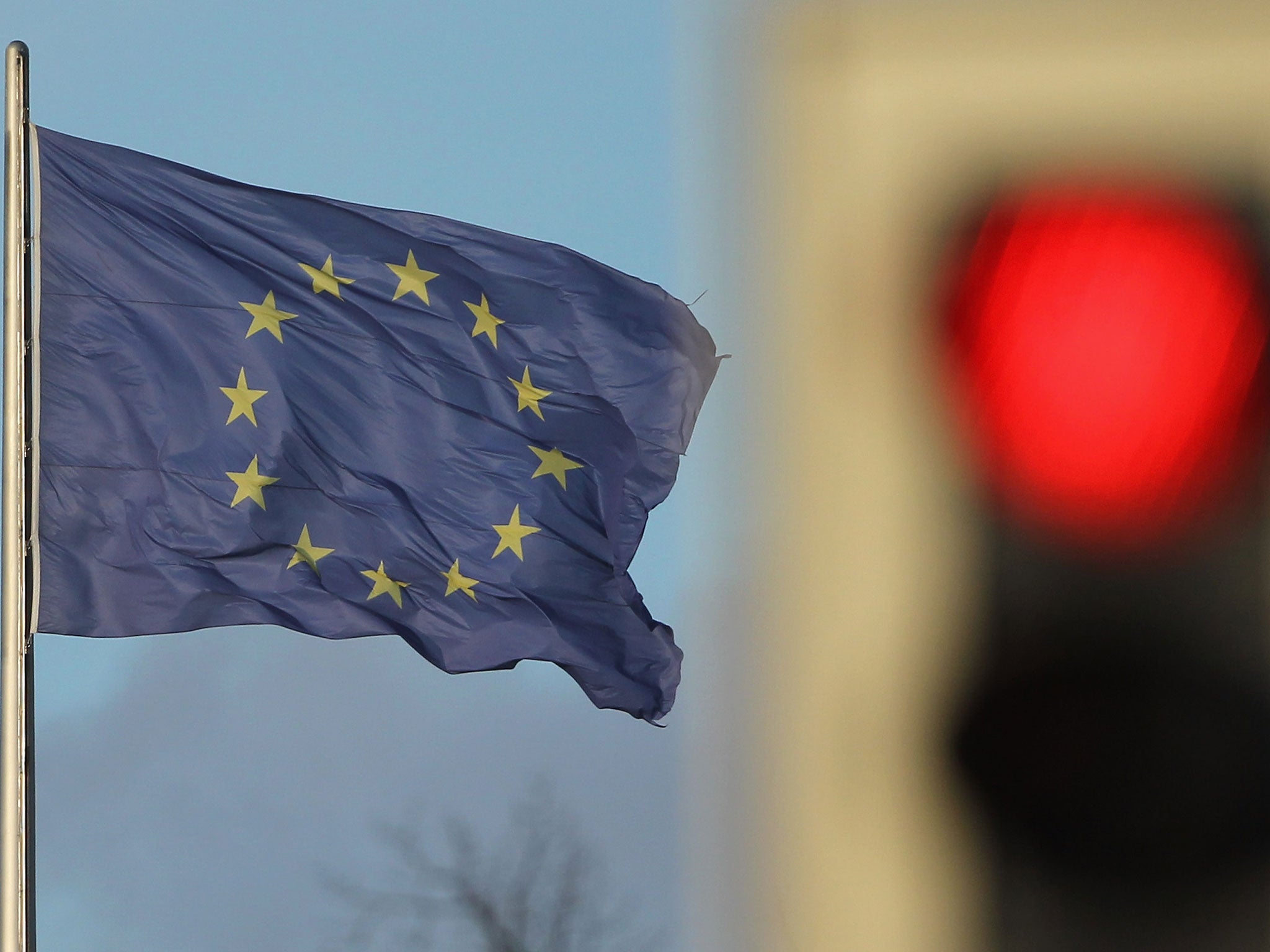Why I decided to vote Out of the EU while watching Euro 2016
To understand the argument, you have to think of European national economies as if they were football teams. Each nation, within wide rules, should be able set its own strategy and tactics just the same


I hope it doesn't sound flippant, but I was finally persuaded to vote Leave while watching the Euro 2016 football championship. It wasn't any single match, but I think things crystallised during England’s unlucky draw with Slovakia. You see, it’s all about competition and the freedom to make your own choices, good or bad.
To understand the argument, you have to think of European national economies as if they were football teams. At various times, some nations will be more blessed than others. The Hungarians, for example, were world-beaters in the 1950s, but not so much now, for example.
At any given time, any given team might have a strong midfield but weak defence; some teams will have cleverer managers; some will have more money to invest in facilities; they’ll all experiment with different formations; they’ll have different strategies for substitutions – you get the picture. Strong teams in due course prosper, or at least do as well as they can Wales or Iceland now, for example); mediocre ones have to rethink (maybe England); the weakest need radical change, often enough sacking the manager (say, Romania or Russia).
So it is, or should be, with economies. Each nation, within wide rules, should be able set its own strategy and tactics just the same. So that means trying any or all of the following on the economy: competitive tax rates; incentives for saving or investment; state sponsorship of industry; nationalisation of strategically important sectors; or ideological privatisation.
A nation can try strong trade unions with a wages policy and "co-determination" in boardrooms; or weak unions, zero-hours contracts and banning strikes in key services. There are as many policy options as there are political parties within nations, and different options will suit different countries at different times. But the crucial point is: if they fail, we sack the manager, or prime minister. If the policy needs a rethink, then you may see U- turns in Parliament. If the policies work, then you get a second, third even a fourth term.
In Britain, that's how it used to be, even under the earlier phase of our time in the EU. Since 1945, we’ve had a socialist command economy with rationing, Tory dirigisme, Wilsonian planning, Heathite corporatism, a few spells of social democracy, a long experiment with Thatcherism, and then what came after (which I suppose is managerialism). Sooner or later, each of these approaches ran out of steam; and the break in policy was executed by an electorate who wanted fresh leadership and a fresh approach. So they sacked the government in a general election.
In other words, the voters, or their representatives in Parliament, were able to "sack the manager", to try and gain a competitive advantage on the economy when we were judged to be losing and falling behind other countries.
This, then, is the essential link between the so-called "economic argument" on Europe, usually held to have been won by Remain; and the sovereignty argument, usually thought to be “owned” by Leave. They are seen as two agendas, but they are in fact as one: two sides of the same pound coin.
As things stand now, the UK is not able to take radical steps to the left or to the right to change economic policy if it wants to. Yes, we have general elections and some freedoms over tax rates and so on; but the general trend in Europe is towards constant harmonisation and limits on national freedom of action.
If we did ever have a government committed to an ultra-low tax economy, I have a strong suspicion the French and Germans wouldn’t let us do it. In many areas, we are simply not allowed to compete with the other EU member states, for fear of a "race to the bottom" – for example, on workers’ rights. In other areas, state planning is unlawful because it interferes with the free movement of capital, or goods or labour.
In 2020, if we voted him in, would Britain actually be able to build a Corbynite socialist paradise under the EU? No – as we can see, with the coming TTIP treaty, which Labour so loathes. If we wanted to have a nationalised steel industry to save jobs in south Wales, we couldn't because – once again – it is against EU rules, or we’d have to win special dispensation. If we wished to subsidise the car industry, we couldn't do that either. We can’t even abolish VAT on home fuel.
The regime of a level playing field across Europe’s economies – one where even traditionally weak countries aren’t even allowed to devalue their own currency to survive – would be fine if there were no other countries in the world hungry for our markets and more than happy to take them from us, along with the jobs that accompany them. But Europe’s social dimension cannot protect its peoples from competition, or at least not in the long run. We can try and ignore what Tory ministers used to call the global race, but it won't go away. That is why Europe is a no-growth zone, complacent in its existing wealth and culture, a fool’s paradise full of beautiful cathedrals and ancient universities and concert halls and lovely restaurants and boulevards but essentially living off its past glories. It has wilfully ignored the rising economies to the east. It is the sick man of the world economy.
Imagine also for a moment a European Union that eventually decides it got it wrong on the Social Chapter and needs fewer workers' rights and weaker unions. Far-fetched, maybe, but it makes the point. There is nothing intrinsically or eternally socialist about the EU (think austerity programmes). If it had a tilt to the right, would Jeremy Corbyn then be as enthusiastic for the EU as he is now? Or would he revert to his Out stance, as in the 1975 referendum when the EU was regarded by him and his mates as a "bosses’ club" that stopped us putting up import controls to save British jobs in manufacturing?
Corbyn is perhaps the weakest Remain case of all, based as it is on one potentially disposable aspect of EU policy: workers’ rights. If you want stronger workers’ rights and social protections, stronger than those we have now even, then vote Labour, not for the Remain campaign. Tony Benn would not be impressed.
The point about running our own affairs is that it enables the British to make our own mistakes, to correct things democratically and to "sack the manager" when the economic policy fails. Democracy is all about electing a government that will, among other things, make us more prosperous by building a more competitive economy. That is the fundamental, and it cannot be sustainably hived off to international, unaccountable control.
This is the problem with the EU. It is as if in the Euro 2016 football competition every single team had to play the same 4-2-4 formation; was not allowed to spend more than any others on team training; had to have the same limited hours for practice; put the subs on at the same time; and had to have all the teams' managers in one big room to decide what tactics the teams were allowed and not allowed to deploy. It would make for a very silly football tournament – and an even sillier one when there is a World Cup tournament out there that recognises no such niceties.
So I shall, reluctantly, be voting Leave. Reluctant because a reformed Europe is much the best answer, but successive attempts at this have proved laughably inadequate. Europe cannot change because it is not a democracy: we cannot sack the manager. Unlike its football, political Europe is a failed project, oddly enough, because it never did succeed in creating one super-state with a proper Euro-government we could all vote for or against, and a political debate crossing borders and cultures.
We do not have that. We do not have, say, a Conservative-Christian-Democrat Euro government arguing about the Europe-wide rate of income tax and budget deficit with a pan-European socialist party leading a multi-nation but single-party opposition. If we did, then a Finnish Conservative EU finance minister would be now debating with his Spanish socialist shadow counterpart on Newsnight or the Today programme, obviously with a centrist Liberal from Belgium chipping in (preferably speaking in everyone else’s second language, English).
A superstate such as that might actually work, after a fashion; but what we have now is the worst of all worlds: the largest single market on the planet, a globally important though troubled common currency zone and the most substantial movement of people across Europe’s borders since 1945 – but with no one accountable for running all this. The EU has superpower-level challenges with less democracy than a parish council. Quite insane.
Here in Britain we will never build a sound economy, or a fairer society, or whatever else we want, if we are unable to elect a government with the power to try and create those things. If we want more migration, or less, or from different places, we can decide. If we wanted, we could elect a government with an "open-door" policy; more realistically, there would be sensible options for a migration policy, and not one that places all Bulgarian economic migrants arbitrarily ahead of any Syrian refugee, say.
Nor need this democratic revolution stop there. If Scotland votes Remain but the rest of the UK votes Leave, then the UK will soon break up and we will have border controls between England and Scotland (if Scotland wants free movement of people from the EU). Then again, if England votes Leave but is prevented from getting out of the EU because the Scottish vote was so pro-EU that it made sure the UK-wide result was for Remain, then I don't give the union much hope either. The English would in effect be denied their choice by a Scottish veto.
Similar arguments would apply to Wales and Northern Ireland. It would not stand. The UK could fracture either way. A shame for sentimentalists, but no matter. As with the EU, if England and Scotland feel they are better off managing their own affairs then let them do so. No one should feel trapped. Thursday will prove that.





Join our commenting forum
Join thought-provoking conversations, follow other Independent readers and see their replies